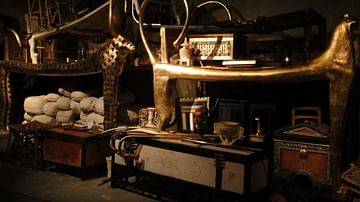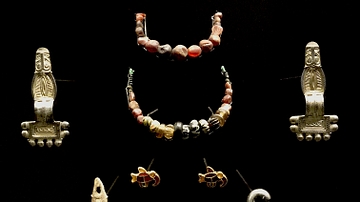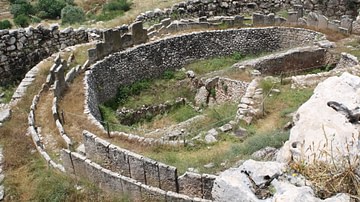Search
Search Results

Article
Grave Goods in Ancient Egypt
The concept of the afterlife changed in different eras of Egypt's very long history, but for the most part, it was imagined as a paradise where one lived eternally. To the Egyptians, their country was the most perfect place which had been...

Image Gallery
A Gallery of Ancient Egyptian Tombs, Coffins, and Grave Goods
Ancient Egyptian burial practices were observed as early as the Predynastic Period in Egypt (c. 6000 to c. 3150 BCE) and continued through the Ptolemaic Dynasty (323-30 BCE), serving to not only provide the living with closure in saying goodbye...

Image
Rich Alemanni Grave Goods
This collection of rich Alemanni grave goods dates from c. 550 CE, and it was found on Bäckerstrasse in what is present-day Zurich, Switzerland. Of particular note are the bird-shaped brooches made of gold with almadine (gemstone) inlay...

Article
Trade Goods of the East India Company
The English East India Company (EIC) was founded in 1600, and it came to control both trade and territories in India, as well as a trade monopoly with China. Goods the EIC traded included spices, cotton cloth, tea, and opium, all in such...

Image
French Soldiers Inspect Goods in Leipzig
French soldiers inspect goods in Leipzig in 1806, near the start of Napoleon's Continental System. By Gottfried Heinrich Geißler, 1824.

Image
Goods Ready for Distribution in Brussels
In Brussels, sacks of white flour and cases of condensed milk are ready for distribution, c. 1916.
Hoover Presidential Library, National Archives and Records Administration, Washington, D.C.

Video
Mask of Agamemnon, from shaft grave V, grave circle A, Mycenae, c.1550-1500 B.C.E.
Mask of Agamemnon, from shaft grave V, grave circle A, c.1550-1500 B.C.E., gold, 12 inches / 35 cm (National Archaeological Museum, Athens)
Speakers: Dr. Steven Zucker & Dr. Beth Harris

Image
Grave Circle A, Mycenae
The royal grave circle within the walls of Mycenae (1600 BCE). It was in the shaft graves here that Heinrich Schliemann discovered in 1876 CE the famous gold death mask attributed (incorrectly) to King Agamemnon.

Definition
Burial
Burial of the dead is the act of placing the corpse of a deceased person in a tomb constructed for that purpose or in a grave dug into the earth. Archaeological excavations have revealed Neanderthal graves dating back 130,000 years, marking...

Image
Gelert's Grave
The 13th-century story of a faithful dog, The Legend of Gelert became so popular that, in the 18th century, a hotel owner in Wales claimed to have found Gelert's grave and charged tourists to see it. Gelert's supposed grave remains a tourist...